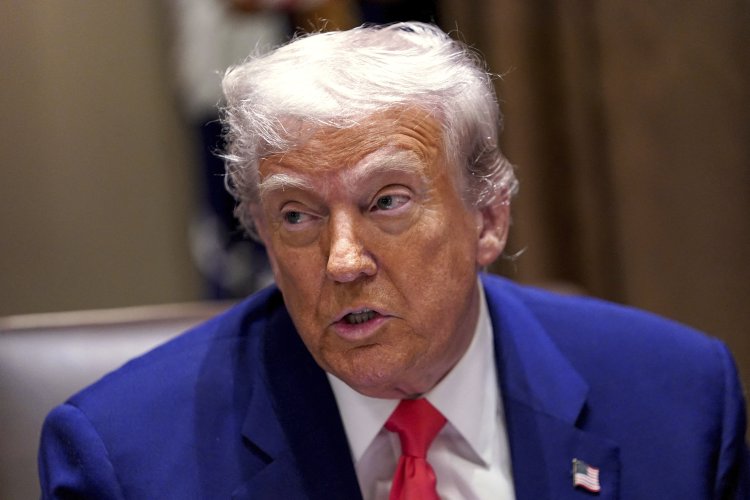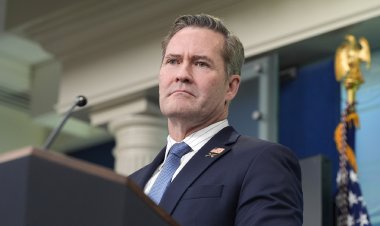Democrats perceive economic opportunity following global market turmoil caused by Trump's trade war
Party strategists believe that communicating a relatable message about the economy might help Democrats find their way out of the wilderness.

Interviews with over a dozen Democratic lawmakers, congressional aides, and media strategists reveal a strong belief within the party that this presents a prime chance to challenge Trump on a vital campaign promise he is perceived to be failing to fulfill. If economic conditions continue to decline, this theme will likely be heavily emphasized in political advertisements. Some candidates have already initiated campaigns featuring attacks on tariffs, while the party is gearing up to harness discontent over economic issues in upcoming town halls.
Democrats view the current economic situation as a significant opportunity since economic issues were a strong point for Trump during his presidential campaign last year, despite the recent easing of an economic crisis following his tariff pause. Trump indicated on Thursday that the cumulative tariffs on Chinese goods now sit at 145 percent, while most other nations face a baseline tariff of 10 percent that was implemented last week. This announcement triggered a downturn in the stock market, with shares plummeting by the day's end.
The Democrats are hoping that the escalating anxiety in global markets and fears of a recession will weaken Republican standing.
“We heard for five freaking months going into the last election, people beating up Biden and Harris about inflation, and the price of fucking eggs,” said longtime Democratic pollster Cornell Belcher, who worked on both of Barack Obama’s presidential campaigns. “So why the hell would we make [ads] about tariffs, as opposed to making it about the economy?”
Belcher emphasized that Trump has inadvertently created a significant opening for Democrats, urging them not to overlook the media attention from a potential global market crisis.
“There is an opportunity here, of historical proportions, given the advantage on the economy writ large that Republicans have had for decades,” he noted. “You see Trump underwater on handling the economy and fighting inflation and bringing down costs – that is a major opening and a historic way for Democrats to take away what has been a major positive for Republicans.”
Recent polling supports the assertion that voters are increasingly dissatisfied with Trump’s economic management. An Economist/YouGov survey released Wednesday indicated a five-point drop in his overall approval rating, including a four-point decline in his handling of the economy. Another poll from Democratic group Navigator Research revealed that 55 percent of 1,000 registered voters disapprove of Trump’s economic management, reflecting an eight-point shift since March. Similarly, a poll from the liberal group Data For Progress confirmed that most voters disapprove of Trump’s economic approach.
However, not all polls reflected significant changes. A Quinnipiac poll released Wednesday showed Trump’s handling of the economy and overall approval rating remained stable or saw only minor declines.
Democrats and affiliated groups are already attributing blame to Trump for his inconsistent tariff strategy, using it as leverage against vulnerable Republicans in the upcoming elections.
Just hours before Trump’s announcement regarding the tariff pause, the Democratic-aligned super PAC American Bridge released audio of Virginia Lt. Gov. Winsome Earle-Sears endorsing Trump’s tariff strategy. In another instance, Democrat Mike Sacks launched his campaign with an ad prominently featuring the word “tariff” alongside a striking image of a plummeting stock market, aimed at his opponent, incumbent Rep. Mike Lawler, already seen as a vulnerable target.
The Democratic-affiliated group Families Over Billionaires is investing six figures into ads attacking Trump’s tax policies. Additionally, Democrats are organizing town halls in GOP-held House districts during the upcoming recess.
The party contends that Trump’s disruptive influence on the economy undermines the central argument he made during his campaign: that his business background would enable him to foster economic growth.
“The one thing that American voters want is security and safety. What they don’t want is chaos and uncertainty,” asserted Alex Jacquez, a former economic advisor to former President Biden and current chief of policy for Groundwork Collaborative. “I think why you've seen such rapid deterioration on his approvals on the economy and on cost of living, tariffs and trade, is because not a single action that he has taken has been in service of addressing people's number one concern, which is cost of living.”
This situation has Democratic ad-makers excited about the potential for impactful messaging.
“Keep it simple and keep it tangible and keep it relatable to everyone's lives here,” advised veteran media strategist Julian Mulvey, who has produced ads for Bernie Sanders and Kamala Harris. He emphasized the importance of avoiding overly complicated explanations of economic concepts like supply chains.
He touched on the idea of political accountability.
“Trump is sort of charging headlong into breaking the economy, and, and he's going to find out when he does,” he said. “Or in the modern vernacular: fuck around and find out.”
The White House has pushed back against the Democrats’ strategy.
“President Trump is the first president in modern American history to take decisive action to finally corner China and restore American Greatness,” stated White House spokesperson Kush Desai. “If Democrats see an opportunity in President Trump and Republicans standing up for everyday Americans and restoring American Greatness, they’re headed for a worse election night than November 5, 2024.”
Several Democratic strategists acknowledged the uncertainty of the economy's state as the campaign season approaches. However, progressive strategists like Chuck Rocha are already envisioning the content of forthcoming anti-Trump attack ads.
“The best way to deliver the ad is from one of his voters, a white guy in his 50s who works in a steel mill, works at whatever the place down the street is that says: ‘Look, I don't really care about either party. I voted for Donald Trump because I thought he would change a rigged system,” Rocha suggested regarding a hypothetical ad targeting Trump. “But he's even rigging it more, and he's rigging it for himself.”
Additionally, the party’s existing strategies concerning Elon Musk's criticisms of government have continued momentum. Some Democratic ad-makers express concern that recent comments by Commerce Secretary Howard Lutinck about "fraudsters" in the Social Security system could backfire.
This area of concern has resonated with lawmakers, including Steven Horsford, who succeeded in reelection in a pivotal state that Trump had won last year. He noted, "Market manipulation... that’s what happened,” referring to Trump’s recent social media statement declaring: “THIS IS A GREAT TIME TO BUY.”
Aarav Patel for TROIB News
Find more stories on Business, Economy and Finance in TROIB business












